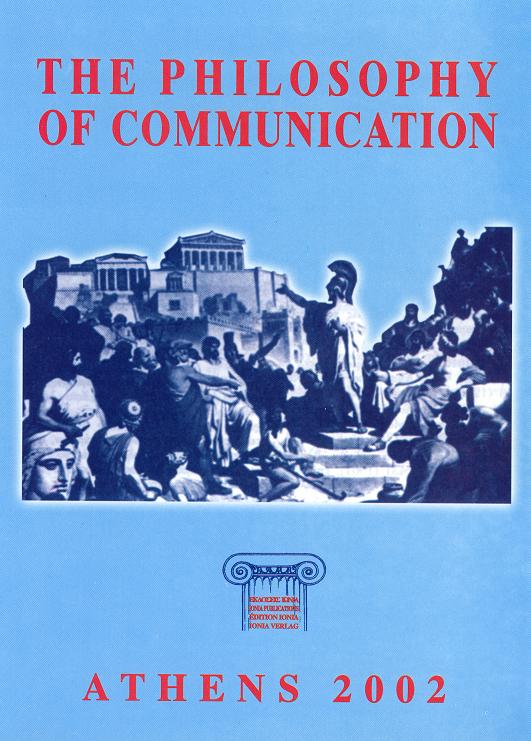Konstantine Boudouris and Takis Poulakos, eds., The Philosophy of Communication, Volume II, Ionia Publications, Athens, 2002, pp.215, ISBN: 960-7670-38-8
The essays included in the present volume offer us a number of ways of understanding philosophies of communication. Prompted by such contemporary phenomena as the explosion of technological advances in mass communication or the pervasive uses of the computer and the Internet, the authors here represented have turned to our Hellenic heritage for ideas that can help us make sense of the ways in which we communicate today. Although each essay differs from the rest in approach, purpose and scope, they all converge on the notion that the problems of communication since antiquity remain fundamentally the same. Accordingly, they all address the same three units of analysis that Greek thinkers addressed many centuries ago: the logos, the speaker, and the listener (s). At the same time, they all gesture, some more explicitly than others, toward the formal character of dialogue and rhetoric, the two modes of communication that occupy center stage in ancient Greek thought.
The essay in this volume, along with the essays in Volume One, are dedicated to Socrates in honor of the 2400th anniversary of his death. As "our first theorist of communication", Socrates gave us not only a manner of engaging each other interpersonally, but also a method for testing and challenging each other's assumptions in public.
Consistent with the complex make up of our world today, contributors have advanced principles of communication that complicate the interpersonal and communicative exchanges Socrates had envisioned as most beneficial to his polis. But they have also kept Socrates' dream alive to-date, 2400 years later- namely, the hope that our public discussions, debates, and deliberations will one day coincide with the best of our dialogical interactions.

VOLUME 2 CONTENTS
- 1. EDITOR INTRODUCTION
- 2. JOHN P. ANTON
- THE ART OF COMMUNICATION AND ITS TRANSFORMATION
- 3. LINDA ARDITO
- MOUSIKE AND THE PRINCIPLES OF INSPIRATION AND COMMUNICATION
- 4. ANTONIA ATANASSOVA
- "LITTLE IMAGES OF THE TRUTH": THE DEFINITION OF RELIGIOUS LANGUAGE IN GREGORY OF NAZIANZUS AND GREGORY PALAMAS
- 5. KEVIN J. AYOTTE
- THE ART OF WAR: ARISTOTLE ON THE RHETORIC AND FEAR
- 6.ADRIENNE E. CHRISTIANSEN & JOHANNA HARTELIUS
- I SEE YOUR POINT: VISUAL ARGUMENT AND RHETORIC FOR THE WWW
- 7. EKATERINA HASKINS
- ARISTOTLE'S ENCOXICAL METHOD: CULTURAL CONTEXTS AND SCIENTIFIC AUTHORITY.
- 8. GOTTFRIED HEINEMANN
- DEDUCTION AND DIALOGUE. REFLECTIONS ON PLATO'S ASSESSMENT OF WRITING
- 9. LENORE LANGSDORF
- THE HOMECOMING OF RHETORIC
- 10. MICHAEL LEFF
- ISOCRATES, RHETORIC AND THE IDEALIZATION OF CIVIC EDUCATION
- 11. AIKATERINI LEFKA
- "XENOI" DANS LES OEVRES DE PLATON. NOTIONS DE DIALOGUE INTERCULTUREL
- 12. ELENI MITROPOULOU
- LA COMMUNICATION CULTURELLE VIA L' ORDINATEUR
- 13. VINCENT MUELLER
- COMMUNICATING THE SAME INFORMATION TO A HUMAN AND TO A MACHINE: IS THERE A DIFFERENCE IN PRINCIPLE
- 14. JOHN DURHAM PETERS
- DIALOGUE AND EROS IN THE PHAEDRUS
- 15. CONSTANTINE V. PROIMOS
- THE CONCEPT OF ART IN ARISTOTLE'S NICOMACHEAN ETHICS, FROM MIMESIS TO COMMUNICATION.
- 16. RICHARD L. PURTILL
- POETRY, FICTION AND MYTHOLOGY AS MEANS OF COMMUNICATION
- 17. FRANCOIS RENAUD
- GORGIAS ET LE GORGIAS: LA RHETORIQUE IN DIALOGUE
- 18. THOMAS M. ROBINSON
- PLATO ON RHETORICS, SPOKEN AND WRITTEN
- 19. JASON SEARS
- CLEVERNESS, PRACTICAL WISDOM AND DELIBERATIVE RHETORIC: ARISTOTLE ON ALCIBIADES
- 20. JANE S. SUTTON
- ON THE STRUCTURE OF RHETORIC IN ARISTOTLE: THE SPACE OF SPEECH, SELF AND OTHER
- 21. JOANNE WAUGH AND LISA WILKINSON
- COMMUNICATION PHILOSOPHY: PLATONIC DIALOGUE AND SOCRATIC METHOD
- 22. GINA ZAVOTA
- BETWEEN DIALOGUE AND MONOLOGUE: THE IMPORTANCE OF SOLILOQUY IN THE WORK OF AUGUSTINE
- 23. MARGARET D. ZULICK
- THE CHOICE OF HOKHMAH: THE BOOK OF PROVERBS AND THE SPREAD OF SOPHISTIC RHETORIC.
- 24. INDEX NOMINUM

